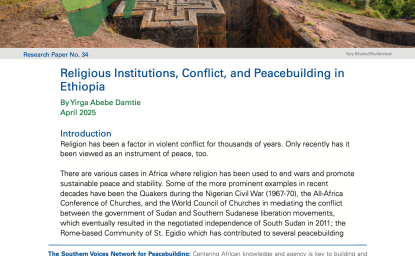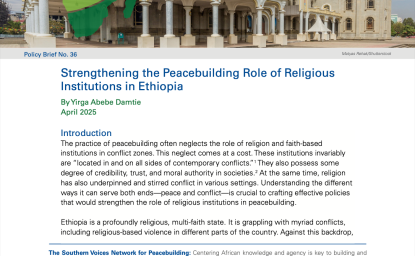P
eople-centered development is at the core of the African Union Agenda 2063 and the UN Sustainable Development Goals. The pledge to pursue inclusive growth, sustainable development, and “leave no one behind” is embedded in the aspirations of both policy documents.
These frameworks have shaped policies across the African continent as governments seek to align national development agendas with continental and global goals. But limited resources mean that governments must prioritize between many competing needs.
What informs governments’ policy prioritization in Africa? The policy priorities of citizens should be the first piece of evidence to consider, which is consistent with the people-centered development agenda that the African Union espouses.
Afrobarometer has documented the policy priorities of ordinary Africans for more than two decades, providing both a current snapshot and a view of shifts over time.
In the most recent Afrobarometer survey, conducted across 39 countries between late 2021 and mid-2023, unemployment ranks as the most important issue for governments to address, cited by 33% of respondents as one of their top priorities. Management of the economy and health (both 29%) follow closely. Infrastructure issues—roads and water supply—are tied at 22%, just ahead of crime/security and education (both 20%). Food insecurity, electricity, poverty, and corruption round out the top policy priorities on the continent.
This citizens’ agenda reflects both a continuity of concerns and a few significant shifts over the past decade. Unemployment has consistently topped the list of policy issues that Africans want their governments to address, and delivery of public services such as health, education, and electricity are usually prominent.
But management of the economy, now ranked as the second most urgent priority, did not feature among the top five issues a decade ago. Across 30 countries for which we have over-time data, concern about economic management has almost doubled since the 2011–2013 survey, probably boosted by the negative impacts of the COVID-19 pandemic. Eighteen countries show marked increases, led by Zambia (+37 percentage points), Tunisia (+36), Senegal (+34), and Ghana (+31).
Crime and security are other issues that have risen significantly on the priority list—by 7 points, on average. These issues are particularly pronounced in the Sahel region, which is plagued by violent extremist attacks. Citizens in several Sahelian countries rank crime and security at or near the top of their policy priorities, with marked increases in Burkina Faso (+45 percentage points), Mali (+40), Niger (+27), Senegal (+24), and Sudan (+15).
Priorities vary by country, so context matters. The United States and other development partners will serve the interests of ordinary Africans by paying attention to their priorities, both longstanding and new, and tailoring support appropriately. Prioritizing job creation and effective economic management would be a good starting point across much of the continent.
Author

Africa Program
The Africa Program works to address the most critical issues facing Africa and US-Africa relations, build mutually beneficial US-Africa relations, and enhance knowledge and understanding about Africa in the United States. The Program achieves its mission through in-depth research and analyses, public discussion, working groups, and briefings that bring together policymakers, practitioners, and subject matter experts to analyze and offer practical options for tackling key challenges in Africa and in US-Africa relations. Read more

Explore More
Browse Insights & Analysis
Religious Institutions, Conflict, and Peacebuilding in Ethiopia

Spying on Poachers

